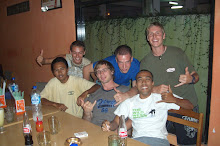 www.krakatauecotour.com
www.krakatauecotour.comThank you for visiting our website, Explore the vast and diverse nature of Krakatau and Ujung Kulon with Krakatau Ecotour, one of the premier travel organizations in Indonesia. We cater all the needs and requirements of visitors, who wish to travel across the country and make their journey most memorable, to be cherished all their lives. Our aim is not to just earn profit but also to provide quality services to our customer. For us the customer satisfaction is kept at utmost priority and it is clearly understood by our 'always-on-our-toes' attitude.!
"ANAK KRAKATOA - The Indonesian volcano known as the "Child of Krakatoa". The mountain in the Sunda Strait, forty year after the main explosion, in 1927, volcanic activity was seen in the sea covering the old caldera, between the sites of the two northernmost former volcanoes of Krakatau, where the greatest activity had occurred at the time of the cataclysm . This young and active volcano has been growing around 6 feet a year and still continues doing so. It grew by the accumulation of ash, and suffered a devastating eruption in 1952,. It is now 300 m high and 5 Km in diameter, and is still active spurting fire and cinder, this like moonlike landscape. It is lonely volcanic island in the middle of the sea.
"The day the world exploded 1883" The eruption on August 27th of 1883 blew apart the island of Krakatoa, with a report so loud that it was heard 3,000 miles away in Australia and India. A tsunami, triggered by the eruption, killed most of Krakatoa's 36,000 human victims. So much particulate matter was ejected into the atmosphere that sunsets world-wide turned blood red for months (inspiring painters the world over), and global temperatures plummeted. 1884 was called "The Year Without a Summer," because Krakatoa's ash prevented the sun's heat from reaching the ground. Perhaps the most surprising result, according to Winchester, was the rise of a radicalized form of Islam that continues to trouble the archipelago nation, due to the colonial government's response to the disaster. I won't spoil the book by giving away the details, but it's an intriguing theory. Volcanoes have always erupted on this planet, and they will continue to do so for many more ages on Earth. Simon Winchester's book "Krakatoa" provides a sweeping view of the physical, environmental, and political fall-out from a major eruption. We must never forget the lessons of the 1883 eruption; after all, Anak Krakatau, the "son of Krakatoa," is growing taller every year."

No comments:
Post a Comment